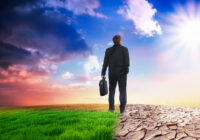Reducing food waste may be one of the easiest ways to slow down global warming.
When we think of environmental damage, the first culprits that come to mind are things such as industrial pollution and oil spills. Yet our relationship with food is one of the major contributing factors to climate change: If global food waste were a country, it would be the third largest producer of greenhouse gas emissions, just behind China and the US.
According to the Food and Agriculture Organization of the United Nations, a third of all food produced for human consumption is wasted annually at a cost of some $680 billion in developed countries. The food wasted in Europe alone could feed 200 million people.
In the US, roughly 40% of the food produced never reaches the table — 365 million pounds a day. And yet over 40 million Americans live in food-insecure households, with more than one in five children being at risk of hunger; for Latin American and African American communities, this number may be as high as one in three.
Growing, transporting and storing food takes a massive toll on the world’s energy and land resources. As we strive to produce ever more food to meet the demands of a growing population, what actually ends up happening is that we trash our planet to grow produce that no one really needs. With standard refrigerators and dinner plates increasing in size over the last few decades, our compulsion to fill them with food is exactly that: a choice, not a necessity.
Out of all the ways to fight climate change, reducing food waste is perhaps the easiest, requiring little more than considerate planning and organization. From MIT’s food cam, to doing away with large trays in cafeterias, to reducing portion size, to startups such as the Copia food-sharing app, there are a hundred and one ways in which we can not only help those in need, but also slow down global warming.
The views expressed in this article are the author’s own and do not necessarily reflect Fair Observer’s editorial policy.
Photo Credit: deyangeorgiev
Support Fair Observer
We rely on your support for our independence, diversity and quality.
For more than 10 years, Fair Observer has been free, fair and independent. No billionaire owns us, no advertisers control us. We are a reader-supported nonprofit. Unlike many other publications, we keep our content free for readers regardless of where they live or whether they can afford to pay. We have no paywalls and no ads.
In the post-truth era of fake news, echo chambers and filter bubbles, we publish a plurality of perspectives from around the world. Anyone can publish with us, but everyone goes through a rigorous editorial process. So, you get fact-checked, well-reasoned content instead of noise.
We publish 2,500+ voices from 90+ countries. We also conduct education and training programs
on subjects ranging from digital media and journalism to writing and critical thinking. This
doesn’t come cheap. Servers, editors, trainers and web developers cost
money.
Please consider supporting us on a regular basis as a recurring donor or a
sustaining member.
Will you support FO’s journalism?
We rely on your support for our independence, diversity and quality.






